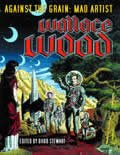Sunday, February 17, 2013
Vault
Lines
Vault
21
The
Vault of Horror
21 (October-November 1951) is notable for the introduction of artist Howard
Larsen and the absence of Graham Ingels. Other than this exception, the Vault
of Horror
lineup was standardized with Johnny Craig, Jack Davis, Graham Ingels and
Jack Kamen.
 When
Ingels returned in issue #22, he started signing his work “Ghastly”. Prior to
that, as evident in #19, he used “G. Ingels” as his signature. The
nickname began in the letters pages (see #18 and #19) where Gaines and
Feldstein gave him the “Ghastly Graham Ingels” label. He obviously had no
objection, because all of his Old Witch stories soon displayed the “Ghastly”
signature. While Feldstein’s version of the Old Witch remained on the front
covers of #18 through #29, Ingels’ depiction of the Old Witch was evolving
inside, possibly influenced by two 1937 witches: Horrit, the Witch in Hal
Foster’s Prince Valiant, and the Witch in Walt Disney’s Snow White and the
Seven Dwarfs. The
Old Witch's origin story is "A Little Stranger!" in The Haunt of
Fear
#14. The Old Witch was inspired by Gaines’ memory of hearing Old Nancy, the
witch of Salem, who was the host of Alonzo Deen Cole's The Witch's Tale, broadcast from
1931 to 1938 on the Mutual Broadcasting System. (Miriam Wolfe was 13 years old
when she began portraying Old Nancy in 1935; she died September 29, 2000.)
When
Ingels returned in issue #22, he started signing his work “Ghastly”. Prior to
that, as evident in #19, he used “G. Ingels” as his signature. The
nickname began in the letters pages (see #18 and #19) where Gaines and
Feldstein gave him the “Ghastly Graham Ingels” label. He obviously had no
objection, because all of his Old Witch stories soon displayed the “Ghastly”
signature. While Feldstein’s version of the Old Witch remained on the front
covers of #18 through #29, Ingels’ depiction of the Old Witch was evolving
inside, possibly influenced by two 1937 witches: Horrit, the Witch in Hal
Foster’s Prince Valiant, and the Witch in Walt Disney’s Snow White and the
Seven Dwarfs. The
Old Witch's origin story is "A Little Stranger!" in The Haunt of
Fear
#14. The Old Witch was inspired by Gaines’ memory of hearing Old Nancy, the
witch of Salem, who was the host of Alonzo Deen Cole's The Witch's Tale, broadcast from
1931 to 1938 on the Mutual Broadcasting System. (Miriam Wolfe was 13 years old
when she began portraying Old Nancy in 1935; she died September 29, 2000.)
Howard
Larsen dished out a sinister meal in the shadowy nightmarish zoo of “That’s a
‘Croc’!”, while Craig’s gator aid to this tale is a rainswept front cover that
diverged from the interior storyline to present a more fantastic situation.
Larsen’s
work brings to mind the phrases “darkness at noon” and “day for night”. Note
that the night scenes on page four do not look that much different from his
daylight depictions in other panels.

During
the 1940s, Larsen mainly specialized in crime and Western stories while drawing
for a variety of publishers, including American (Spy-Hunters), Avon (Romantic
Love, Slave Girl, Wild Bill Hickok), Charlton (Marvels of Science), Et-Es-Go (Suspense), Fiction House (Jungle,
Planet, Wings),
Novelty (Blue Bolt),
St. John (The Texan) and Victory (X-Venture). For EC he contributed to Crime
Patrol
#12 (“The Hanged Man’s Revenge”) and returned with “The Borrowed Body” in Tales
from the Crypt
#26.
“Child’s
Play” is another in Kamen’s “widdle kid” series. EC later did a different story
titled “Child’s Play”, illustrated by Joe Orlando, in the fifth and final issue
of M.D.
(December 1955-January 1956).
“Trapped!”,
illustrated by Jack Davis, is based on the simple premise that it’s not easy to
handle flypaper. Such a situation was used most famously by the animator Norm
Ferguson in Walt Disney’s “Playful Pluto” (1934), a cartoon viewed by prisoners
in Sullivan’s Travels (1940). Pluto trapped in Tanglefoot flypaper is
regarded as an important milestone in the history of character animation
because Ferguson illustrated thought processes through pure pantomime. Pluto
was seen not just as a dog but as a thinking character.
“Trapped!”
has a number of inconsistencies and unanswered questions. Why is Marty King
“ridin’ hobo style” on a freight train when he has a bag full of cash? Why not
just buy a ticket? Perhaps he stole the money, but there is no mention of such.
Why does he kill the friendly old man? The reader is given not even a hint,
other than the unconvincing notion that a ”cursed place” could trigger such a
sudden unmotivated action. With this weak explanation, the plot pieces come
unglued, and the story collapses despite the vigorous art treatment by Davis.
Labels: ec

